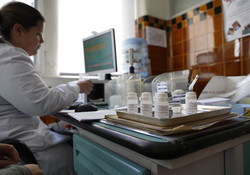Health systems response to tuberculosis

WHO/Marcus Garcia
For further information, contact:
WHO Regional Office for Europe
UN City, Marmorvej 51
2100 Copenhagen Ø, Denmark
Email: eurotbrep@who.int
The WHO European Region includes both low and high tuberculosis (TB) incidence countries, bearing about 3% of the global TB burden (in absolute numbers). In 2015, more than 32 000 people lost their lives to TB in the Region, which is also home to one fifth (21%) of the world’s multidrug-resistant TB (MDR-TB) cases. MDR-TB lasts much longer, is more difficult and costly to treat, is prone to more side-effects and has lower probability of treatment success than its drug-susceptible form.
National health systems face increasing challenges in the context of the economic downturn and more dynamic and unpredictable movements of people, both within countries and across borders. In addition, the fragility of national health systems may be worsened by an overall reduction in external donor funding for TB in the Region, as countries generally become wealthier. Providing sustainable health financing, effective people-centred models of care and adequate human resource developments in rapidly changing environments is proving to be demanding for countries. In many countries, TB and especially MDR-TB may be indications of partial health systems failure.
The WHO Regional Office for Europe is supporting countries in implementing effective and efficient TB service delivery systems, shifting towards more outpatient-oriented and integrative models of care, with sustainable financing and well-aligned payment mechanisms.
WHO also seeks increased political commitment to transform health systems to end TB, through regional cooperation and sharing of evidence.



